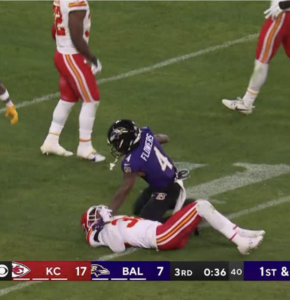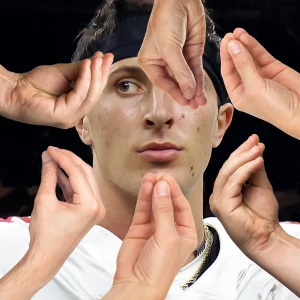In the US right now there is a lot of buzz about American football, after the playoff games this past weekend determining who plays in the Superbowl, coming up soon. As is always the case in football, the games on Sunday were not just athletic contests but spectacles, in which lots was happening beyond sports, including interesting nonverbal communication. In the game between Kansas City and Baltimore, much of the attention was focused on one particular fan, Taylor Swift, in the audience to cheer for boyfriend Travis Kelce, a player for Kansas City. One of the memorable nonverbals was their kiss on the field at the end of the game.
Most of the nonverbals in football games involve not kisses, but dances or other celebrations when touchdowns are scored, which has become common practice in professional football. In the Kansas City game, a turning point revolved around a different kind of nonverbal, namely taunting on the part of a Baltimore player, Zay Flowers, after a tackle. He was called for a penalty, which stopped his team’s momentum. Later in the game, Flowers was about to cross the goal line and score, when the very player he had taunted knocked the ball out of his arms, preventing a touchdown. Seemed like karma.
That incident brought to mind a story from the New York Times recently on that topic of football and nonverbals. It deals with a gesture made by backup quarterback for the New York Giants, Tommy DeVito, an Italian American. In the words of Mark Rotella, the article’s author, DeVito, after throwing for a touchdown, “raised a right hand and pinched his finger and thumb together in an Italian gesture that means, roughly, ‘Whaddya want?’”. The player subsequently used the gesture again several times and later was picked up by fans, as well as being used mockingly by opponents after sacking the quarterback.
The author, himself an Italian-American, very much identified with DeVito’s gesture and discussed in the article how important hand gestures are to Italians (and to Italian-Americans). Stereotypes tend to have an element of truth to them, which according to Rotella is the case here, as of all ethnic groups in the world, Italians have the most widespread reputation for using body language to communicate.


















